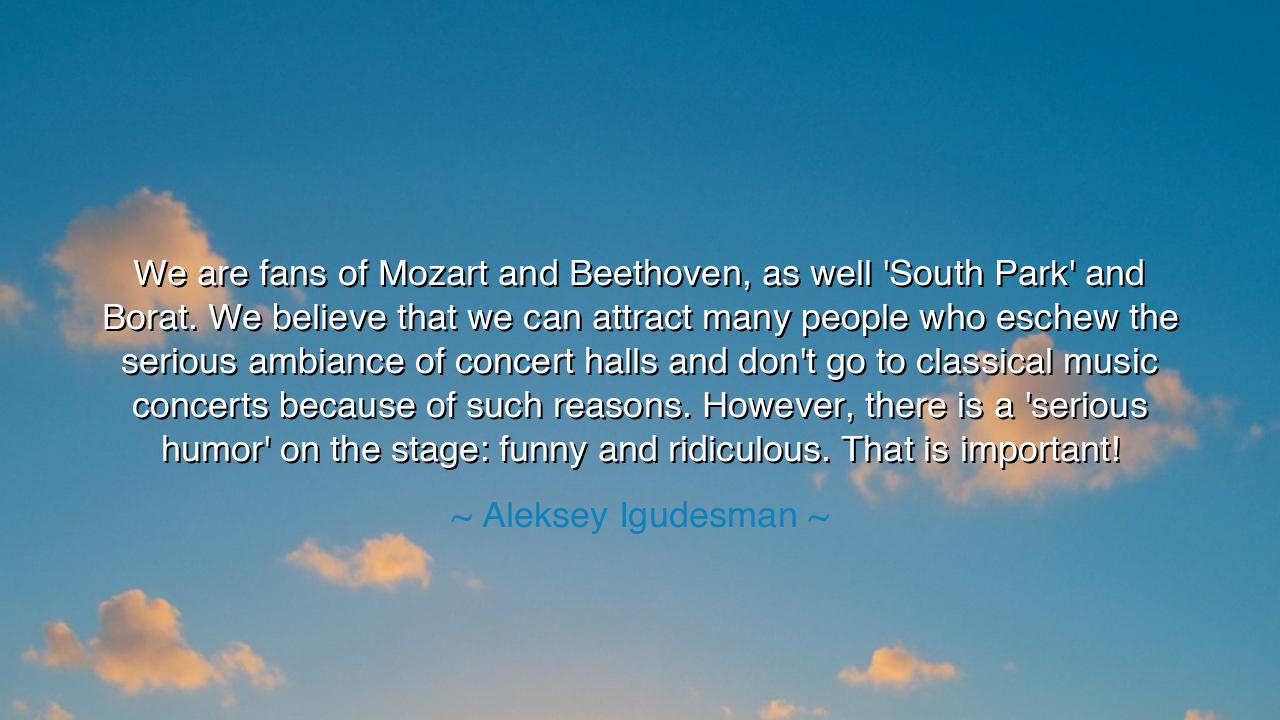
We are fans of Mozart and Beethoven, as well 'South Park' and
We are fans of Mozart and Beethoven, as well 'South Park' and Borat. We believe that we can attract many people who eschew the serious ambiance of concert halls and don't go to classical music concerts because of such reasons. However, there is a 'serious humor' on the stage: funny and ridiculous. That is important!






Hear the words of Aleksey Igudesman, the violinist-philosopher who weds the noble grace of Mozart and Beethoven with the irreverent spirit of South Park and Borat: “We are fans of Mozart and Beethoven, as well as ‘South Park’ and ‘Borat.’ We believe that we can attract many people who eschew the serious ambiance of concert halls and don’t go to classical music concerts because of such reasons. However, there is a ‘serious humor’ on the stage: funny and ridiculous. That is important!” In this utterance lies a revelation that stretches beyond music — it is a call for freedom in art, a plea for joy in reverence, and a reminder that laughter and beauty are two strings of the same instrument.
The origin of this quote lies in Igudesman’s rebellion against the cold solemnity that had come to surround classical music. For centuries, the concert hall had become a temple of silence, where the audience sat stiffly in awe, afraid to move, afraid to laugh. The music that once stirred the soul of peasants and kings alike had become confined to the elite. Igudesman, together with his creative partner Hyung-ki Joo, sought to tear down those invisible walls. Their performances — wild, witty, virtuosic, and profound — blend the divine brilliance of Beethoven’s sonatas with the daring absurdity of modern satire. They proved that genius and humor are not opposites, but companions. And through this marriage of the sacred and the silly, they breathed life back into a tradition that had begun to suffocate under its own reverence.
When Igudesman speaks of “serious humor,” he does not speak of mockery or cheap laughter. His humor is deliberate, crafted with love and mastery. It is funny and ridiculous, yes — but beneath it lies discipline, insight, and respect. This is what makes it “serious.” The laughter he brings is not destruction but renewal — the kind that opens the heart and clears the air, allowing listeners to rediscover the pure joy that once made them fall in love with music. Just as Mozart, that mischievous genius, hid laughter inside his compositions, and Beethoven, the fierce titan, infused his work with human warmth and irony, so too does Igudesman continue their lineage. In laughter, he finds truth; in play, he finds purpose.
The ancients understood this wisdom. The Greek playwright Aristophanes, whose comedies mocked kings and gods, taught through laughter what philosophers taught through logic. His “ridiculous” plays revealed serious truths — that power without humility collapses, and that joy is sacred. Likewise, Aleksey Igudesman’s performances echo that ancient spirit: they are not irreverent for the sake of rebellion, but for the sake of humanity. For what is art, if not the mirror of the human soul? And is not the human soul both noble and foolish, divine and absurd? To reject humor in art is to reject half of what it means to be alive.
Consider the tale of Joseph Haydn, the father of the symphony, who understood that laughter could be music’s greatest weapon. In his “Surprise Symphony,” he lulled his audience with a gentle melody before striking them with a sudden, thunderous chord — a prank that shocked the room into laughter. But that joke was not merely for amusement. It was Haydn’s way of waking his listeners, reminding them that music is alive, unpredictable, and free. In the same spirit, Igudesman seeks to awaken modern audiences dulled by etiquette and expectation. His humor jolts them not into mockery, but into awareness — awareness that art, like life, is meant to breathe, not to sit entombed in seriousness.
When Igudesman says he and his partner are fans of ‘South Park’ and ‘Borat’ alongside Mozart and Beethoven, he is proclaiming that true artistry has no hierarchy of expression. The sacred and the profane, the elegant and the outrageous, can coexist when wielded with purpose. It is not the form that defines greatness, but the intention — to move, to awaken, to connect. The laughter of Borat and the genius of Beethoven both spring from the same well: the courage to reveal truth through sound and spirit. Thus, Igudesman’s “serious humor” is a bridge — between centuries, between classes, between laughter and learning.
O listener, take this teaching to heart: do not fear to mix the profound with the playful, nor to meet the sacred with a smile. The artist who laughs at his art does not dishonor it; he redeems it. In your own life, whether you labor with your hands, your voice, or your mind, bring forth this same serious humor. Approach your work with devotion, but do not let devotion harden into rigidity. Let your laughter be intelligent, your seriousness alive with warmth. For it is through balance that creativity blooms, and through joy that mastery endures.
Thus, let Aleksey Igudesman’s words resound as both lesson and blessing: “There is a serious humor on the stage: funny and ridiculous. That is important!” For humor, when born of love, is not a threat to art, but its salvation. It is the spark that rekindles wonder, the melody that keeps silence from turning to dust. Laugh, then, in the presence of greatness — not in defiance, but in gratitude — for laughter, too, is a kind of music, and the world is its concert hall.






AAdministratorAdministrator
Welcome, honored guests. Please leave a comment, we will respond soon